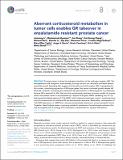| dc.contributor.author | Li, Jianneng | en_US |
| dc.contributor.author | Alyamani, Mohammad | en_US |
| dc.contributor.author | Zhang, Ao | en_US |
| dc.contributor.author | Chang, Kai-Hsiung | en_US |
| dc.contributor.author | Berk, Michael | en_US |
| dc.contributor.author | Li, Zhenfei | en_US |
| dc.contributor.author | Zhu, Ziqi | en_US |
| dc.contributor.author | Petro, Marianne | en_US |
| dc.contributor.author | Magi-Galluzzi, Cristina | en_US |
| dc.contributor.author | Taplin, Mary-Ellen | en_US |
| dc.contributor.author | Garcia, Jorge A | en_US |
| dc.contributor.author | Courtney, Kevin | en_US |
| dc.contributor.author | Klein, Eric A | en_US |
| dc.contributor.author | Sharifi, Nima | en_US |
| dc.date.accessioned | 2017-03-28T23:49:10Z | |
| dc.date.issued | 2017 | en_US |
| dc.identifier.citation | Li, J., M. Alyamani, A. Zhang, K. Chang, M. Berk, Z. Li, Z. Zhu, et al. 2017. “Aberrant corticosteroid metabolism in tumor cells enables GR takeover in enzalutamide resistant prostate cancer.” eLife 6 (1): e20183. doi:10.7554/eLife.20183. http://dx.doi.org/10.7554/eLife.20183. | en |
| dc.identifier.issn | | en |
| dc.identifier.uri | http://nrs.harvard.edu/urn-3:HUL.InstRepos:31731720 | |
| dc.description.abstract | Prostate cancer is driven by androgen stimulation of the androgen receptor (AR). The next-generation AR antagonist, enzalutamide, prolongs survival, but resistance and lethal disease eventually prevail. Emerging data suggest that the glucocorticoid receptor (GR) is upregulated in this context, stimulating expression of AR-target genes that permit continued growth despite AR blockade. However, countering this mechanism by administration of GR antagonists is problematic because GR is essential for life. We show that enzalutamide treatment in human models of prostate cancer and patient tissues is accompanied by a ubiquitin E3-ligase, AMFR, mediating loss of 11β-hydroxysteroid dehydrogenase-2 (11β-HSD2), which otherwise inactivates cortisol, sustaining tumor cortisol concentrations to stimulate GR and enzalutamide resistance. Remarkably, reinstatement of 11β-HSD2 expression, or AMFR loss, reverses enzalutamide resistance in mouse xenograft tumors. Together, these findings reveal a surprising metabolic mechanism of enzalutamide resistance that may be targeted with a strategy that circumvents a requirement for systemic GR ablation. DOI: http://dx.doi.org/10.7554/eLife.20183.001 | en |
| dc.language.iso | en_US | en |
| dc.publisher | eLife Sciences Publications, Ltd | en |
| dc.relation.isversionof | doi:10.7554/eLife.20183 | en |
| dc.relation.hasversion | http://www.ncbi.nlm.nih.gov/pmc/articles/PMC5305204/pdf/ | en |
| dash.license | LAA | en_US |
| dc.subject | prostate cancer | en |
| dc.subject | androgens | en |
| dc.subject | glucocorticoids | en |
| dc.subject | nuclear receptors | en |
| dc.subject | treatment resistance | en |
| dc.subject | Human | en |
| dc.title | Aberrant corticosteroid metabolism in tumor cells enables GR takeover in enzalutamide resistant prostate cancer | en |
| dc.type | Journal Article | en_US |
| dc.description.version | Version of Record | en |
| dc.relation.journal | eLife | en |
| dash.depositing.author | Taplin, Mary-Ellen | en_US |
| dc.date.available | 2017-03-28T23:49:10Z | |
| dc.identifier.doi | 10.7554/eLife.20183 | * |
| dash.authorsordered | false | |
| dash.contributor.affiliated | Taplin, Mary-Ellen | |


